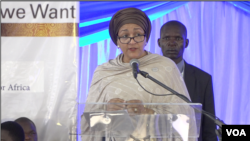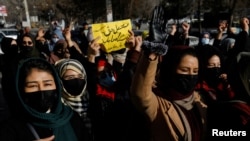U.N. Deputy Secretary-General Amina Mohammed said Wednesday that the international community’s best leverage to persuade the Taliban to reverse restrictions on Afghan women’s rights is the group’s desire for international recognition.
“I went into Afghanistan thinking perhaps the most conservative of them [Taliban leaders] didn’t care about recognition — they do,” Mohammed told reporters of her mission there. “Recognition is one leverage that we have and should hold on to.”
The deputy secretary-general returned Tuesday from a two-week mission that took her and her delegation, including the head of U.N. Women and the deputy political and peacebuilding chief, to several Muslim countries, as well as to the Afghan cities of Kabul, Kandahar and Herat. She also met in the region with former Afghan President Hamid Karzai and former Chief Executive Officer Abdullah Abdullah.
She said it is clear the Taliban want recognition, laying out to her what they view as their achievements – claiming to have eradicated corruption and stopped poppy production while extending a general amnesty. However, a U.N. report released in November found that the area under poppy cultivation has increased under Taliban rule.
“All of this, we said, was not sufficient in terms of its implementation,” Mohammed said she told them.
Mohammed, who is Muslim, said one of the biggest challenges in dealing with the group, which “is loyal to the emir and the emirate,” is how to bring them “from the 13th century to the 21st.”
Decrees
She noted that as the Taliban have taken away rights, they have said they would later revisit the issue. Mohammed pressed officials for a specific timeline and said she was told only “soon.”
“And for them, what they want to do is create an environment that protects women,” she said. “Their definition of protection would be, I would say, ours of oppression.”
She said those “protections” include rules on education, school curriculum, work and dress codes that she sees as “red flags.”
The deputy U.N. chief said the Taliban are eager to keep international humanitarian assistance flowing, despite their widely condemned December 24 ban on Afghan women working with domestic and international aid groups. Some international NGOs suspended their work after the decree.
The World Food Program estimates nearly 20 million Afghans are acutely food-insecure, including more than 6 million people on the brink of faminelike conditions.
A few days before the work edict, the Taliban forbade females from attending school beyond the sixth grade.
Mohammed said she was relieved that a third decree they feared might come down this month, or even during their mission, barring foreign women from working with international organizations, had so far not happened.
“I don’t say that it won’t, but clearly the pressure that we are putting on has stopped that rollback as quickly. … We will continue to put that pressure on and engage,” she said.
International conference
Mohammed said discussions are underway for an international conference to be co-hosted by the U.N. and the Organization of Islamic Cooperation (OIC) in March in the region on women in the Muslim world.
“This would bring in the issues of Afghanistan, but also the region,” the deputy secretary-general said. “I often say this, when Malala [Yousafzai] was shot, she was shot in Pakistan. So there is a region[al] problem. There is a region that also needs to come to the front with pushing for the rights of women in Islam.”
As for Afghan women, Mohammed insisted the international community will not abandon them.
“It’s not when it gets hard that we drop off,” she said. “It’s when it gets hard that they see more of us, and we are there in solidarity with them.”





